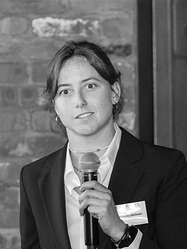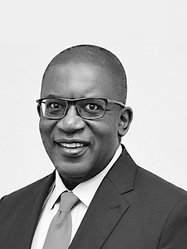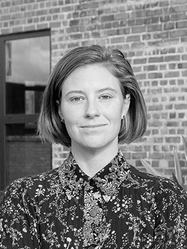Imperial has been the perfect springboard for three specialists working to change the face of our future built environments.
Interviews: Kat Brown
Our Imperial alumni

Antoinette Nothomb
MSc, Business Management 2023 and co-founder of Cyanoskin, producers of an innovative living algae paint that transforms buildings into carbon dioxide-absorbing structures.
What is Cyanoskin?
I’d wanted to do something in sustainability and was always passionate about biomimicry – replicating nature’s solutions. Cyanoskin is a completely new carbon capture approach. It’s an algae-based coating that we can spray onto the façade of any building, and through photosynthesis it absorbs CO2. Because it’s living, it’s constantly growing, so it’s constantly capturing the carbon, and we use a sensor and dashboard to track how much is captured.
Who is it aimed at?
It’s mainly construction companies who want to reach their net zero targets for their clients. In the EU, with its tight regulations and fines if you don’t reach those targets, it’s straightforward, but in the US, without that regulation, it’s a much different pitch.
Why did you choose Imperial?
If you want to start a business and want an ‘in’ into the EU and UK markets, Imperial is the best in Europe. I launched my business there, they helped us go full time, supported us with grants, pushed us in front of the right people, gave us legal advice, IP help, free lab space, free offices... everything! But my eureka moment was meeting Emma Money from the Royal College of Art, who had been developing algae paint. She showed me her ideas, I showed her mine and together we realised we had something we could scale.
What role can Imperial play in the future?
Imperial’s forward thinking is helping to change the world. In five years I would like to see Cyanoskin proving our technology, gaining a significant chunk of the UK and EU markets and starting to take off in the US. We have one of the strongest solutions to carbon capture out there – and Imperial’s support is continuing to make our company bigger and better. This year we won Imperial Enterprise Lab’s Venture Catalyst Challenge and we still have all the support of lab space, offices and other practical support. Imperial itself has such a commitment to its students and its startups, but more than that, to invention and innovation. There’s no place quite like it.

Solomon Asamoah
MEng, Chemical Engineering 1987, investment consultant and former CEO of the Ghana Infrastructure Investment.
Your Imperial degree was in chemical engineering. How did you get into infrastructure investment?
As I was completing my degree, all the investment banks descended on Imperial trying to recruit engineers – problem-solvers. I joined HSBC but, as a Ghanaian, I wanted to be involved in investment banking in Africa, so I left to work for the International Finance Corporation, first in Washington and then across Africa.
Does an interest in African investment logically lead on to infrastructure?
I do think that if you’re wanting to make a positive impact in the world, you inevitably try to figure out what is preventing emerging markets from growing – and in Africa, that’s infrastructure. With good infrastructure you can keep value on the continent – set up manufacturing industries that will lead to greater economic growth and skills development.
How crucial would you say is infrastructure investment in Africa?
The best way for Africa to develop is to process and add its own value, rather than be dependent on the graces of the other parts of the world. That’s why there’s been such a backlash on aid – should the money be spent helping people live or invested to generate jobs, encourage local innovation and local wealth? A booming Africa benefits the developed world. Migrants come into Europe and the US for a better life – they won’t do that if there is opportunity at home, and I think western governments are beginning to understand and embrace that idea.
What role can Imperial play?
The university is setting up a hub in Ghana and approached me to help. It’s working on an operation to bring Imperial science and engineering students to work in Ghana on infrastructure and sustainable development. We need more innovation, new ways of producing power, and new ways of laying roads and constructing buildings to ensure they are sustainable. Imperial’s interaction with Ghana and other African countries is really pushing this forward, and as an Imperial graduate I’m really proud of that.

Sinéad Conneely
MSc Applied Mathematics 2009, Executive MBA 2024 and co-founder of Simple Works, a socially conscious structural engineering company.
How has your Imperial experience shaped you?
I think most of all, Imperial broadens the way you think. I was good at maths at school but coming here I realised I knew nothing – it was all in the same broad sphere yet somehow completely different. And now I’m doing my Executive MBA, which is excellent – a technical programme at a university that’s really focused on tech and innovation. Because of my Imperial background, I’m already thinking that way.
How did you start Simple Works?
It all stemmed from that different way of thinking. My co-founders and I were all working together at a bigger consultancy and we got disillusioned, asking: ‘Who are these projects really serving?’ We wanted to ensure the projects we worked on are for the many, for the cities and communities we work in. As Simple Works, we’ve built up a portfolio of mostly affordable social rent housing, that also focuses on environment and sustainability.
Do you see yourselves as innovators?
I think we were maybe at the vanguard of our generation, wanting to do things differently, but I think it’s the generation behind us who are truly outraged and demanding better. We were just the start, but in that next generation the majority want better cities.
Where are the challenges?
The sad truth is that for projects of social value, fees are lower. Councils, charities, community groups have fewer funds so it’s a difficult balance to deliver really good engineering work and get paid properly for it. There’s only so much public money available and therefore you have to be innovative if you’re going to deliver quality with that. And since around 80 per cent of the buildings that will exist in 2050 have already been built, we need to look more at energy efficient refurbishments and extensions.
There’s a greater need than ever to think holistically and consider things in the round – it’s about innovative problem-solving, weighing up social value versus environmental value. As a society we need Imperial to keep encouraging people to do that, and push back the boundaries.